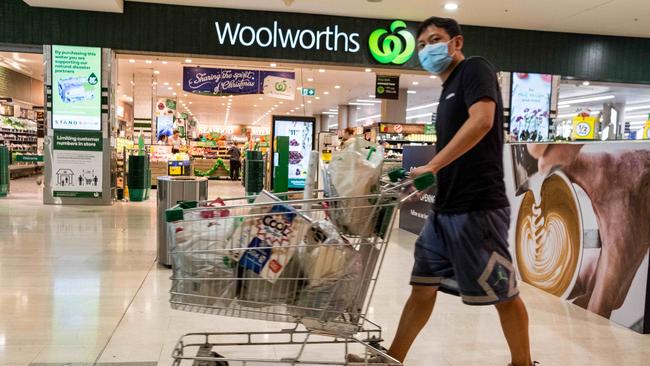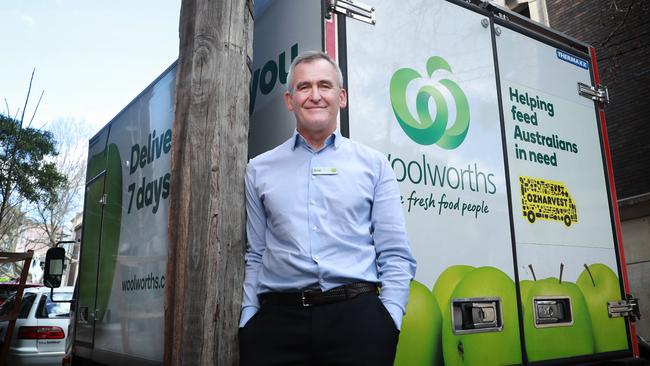Woolworths posts weaker sales in March quarter after pandemic shopping boom
Woolworths’ sales weakened in the March quarter and it expects further declines in the quarter to June as more normal shopping patterns resume.

Woolworths shares fell 4 per cent after chief executive Brad Banducci unveiled stronger March quarter sales than rival Coles but then punctured investor enthusiasm by forecasting shrinking sales to June as Coles looks to have stolen back the ascendancy.
In the never-ending battle for shoppers between the supermarket majors, the grip on the lead is so fickle that consumers look to be switching their loyalties from month to month, and between local neighbourhood stores and larger shopping centres, handing Woolworths victory one month then snatching it away the next.
Mr Banducci also struck a more pessimistic view for the outlook for grocery volumes heading into the middle of 2021 compared to Coles CEO Steven Cain, who released March quarter sales on Wednesday.
Woolworths reported its flagship Australian supermarkets recorded a total sales decline of 0.7 per cent to $11.1bn with comparable sales declining 2.1 per cent.
This easily beat Coles which posted a 6.4 per cent decline in same-store sales for the March quarter.
Retreating sales for the supermarket operators were expected by the market given the pair were cycling double-digit growth for the March quarter in 2020 when the emergence of the COVID pandemic triggered panic buying and shoppers stripping products from the shelf.
However, while Mr Cain said sales for the first four weeks of the June quarter were up by around 4 per cent, helped by a return to shopping centres where his supermarkets are more prevalent, Mr Banducci warned of flat sales for the first few weeks of the current quarter.
He struck a further negative tone when adding that he now expected sales to decline for all his businesses, other than hotels, between March and June.

“While food customers are still shopping less frequently, the growth in the number of items customers put in their baskets is slowing. Customers are also shopping more on weekends, state-based performance is becoming more balanced and there is less divergence in trading across the fleet, other than in CBD and transit locations,” Mr Banducci said.
Shares in Woolworths fell almost 4 per cent on the trading update, before closing down $1.60, or 3.86 per cent, at $39.81.
Woolworths shares also dipped on Wednesday when Coles issued its sales update and the stock is down 6 per cent in the last fortnight.
Mr Banducci did mirror comments from Coles that shoppers were returning to more normalised patterns of buying behaviour following last year’s outbreak of COVID, although Woolworths is predicting more volatility.
The retailer said on Thursday that for its current trading and outlook, sales growth for the first three weeks of April had remained volatile and impacted by prior year growth rates and the timing of public holidays.
In Australia, its flagship supermarkets business saw total sales come in broadly flat compared to last year.
This reflects the cycling of mid-single-digit sales growth in April last year in comparison to double-digit sales growth in May and June when panic shopping triggered by the emergence of COVID saw shoppers strip products from the shelves.
In terms of its online sales, Woolworths said on Thursday that e-commerce sales for its food and grocery arm increased 90.5 per cent to $878m, with e-commerce penetration of 7.9 per cent up from 4.1 per cent for the same time last year.
Overall, Woolworths Group total sales for the March quarter rose 0.4 per cent to $16.56bn and total e-commerce sales rose 64.2 per cent to $1.341bn.
At the company’s New Zealand supermarkets, total sales declined by 6.9 per cent to $1.792bn and were down 7.5 per cent in like for like sales.
For Big W over the quarter, sales increased by 18.3 per cent to $1.024bn with comparable sales growth of 20 per cent.
It said strong sales growth continued every month in the quarter and across all major categories, despite cycling the initial COVID demand surge from late February in the prior year.
Endeavour Drinks, its liquor retail arm, saw sales lift 6.3 per cent to $2.392bn while same store sales rose 5.5 per cent.
Hotels sales rose 11.5 per cent to $390m.
Woolworths said the $10bn demerger of its Endeavour Group liquor and hotels businesses remains on target for late June.
The retailer also announced that plans to build a Dan Murphy’s liquor outlet at Darwin Airport had been cancelled following community angst over the development and an independent panel organised by Woolworths which had advised against the site going ahead.






To join the conversation, please log in. Don't have an account? Register
Join the conversation, you are commenting as Logout